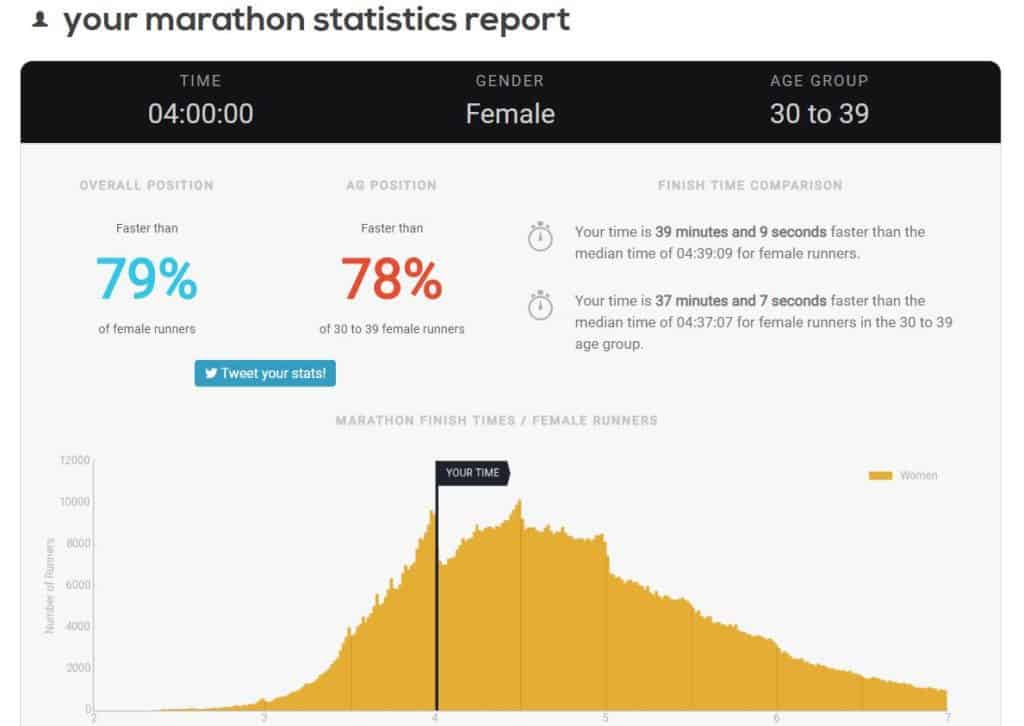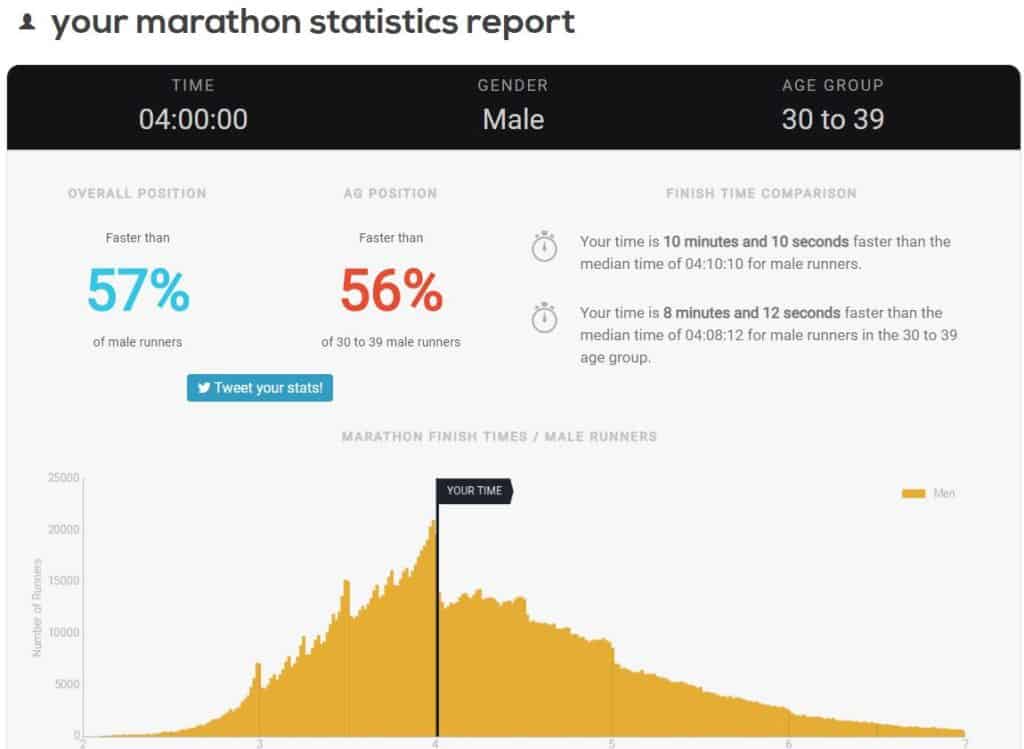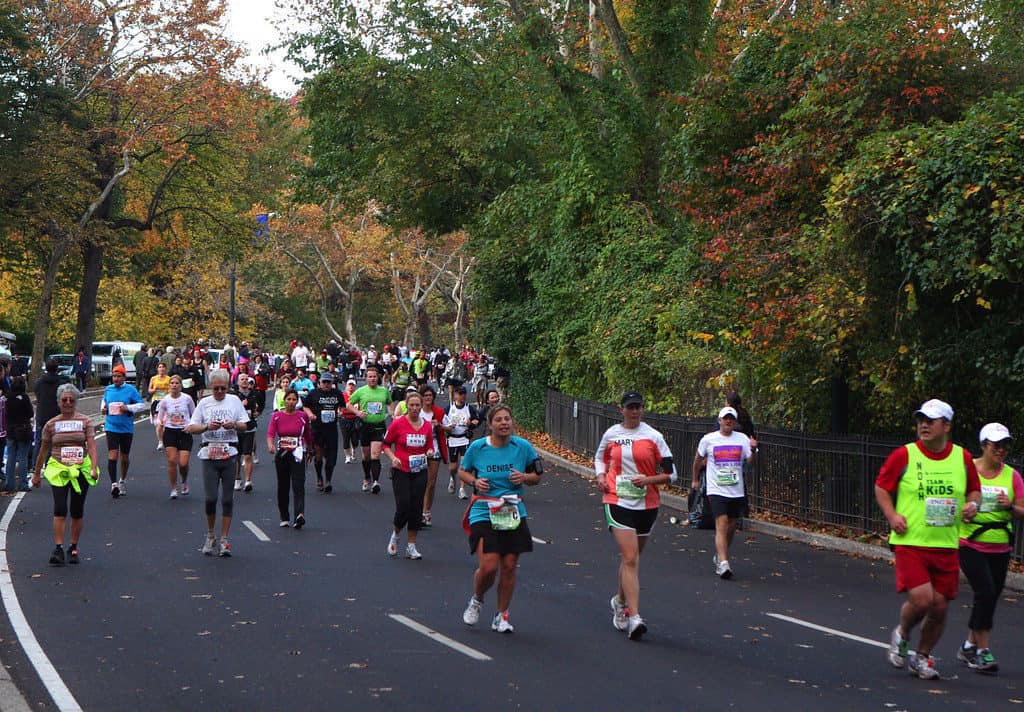One negative side effect of running can be getting caught up in the comparison trap. In a world of in your face social media, this has become even more difficult to avoid. Instead of focusing on being grateful for what we are able to do, comparison can make us feel like our personal accomplishments aren’t enough. But sometimes in timed events such as a marathon, making comparisons or having an idea of an average can also give us a competitive drive to want to get better – which can also be a good thing. People often ask me what a good marathon time so it’s a topic I’d like to address.
A good, or above average, marathon time is about 4 hours for men and 4.5 hours for women. But a “good” marathon time is based upon many different factors, such as age, experience, and what your goals are. What is good for you might not be good for someone else and vice versa. Falling below the average doesn’t mean your time isn’t good if you’re working toward your personal best.
It is normal to want a “good” or respectable marathon time, especially when you’re committing so much of your life to this one culminating event. Here we’ll talk about what makes a “good” marathon time based on an average and how you can decide if your time is good enough for you personally (because that’s what actually matters.)
What Determines a Good Marathon Time
Before we begin, I think we can agree that a “good” time isn’t going to be the same for everyone. We all have different factors contributing to our performance and all toe the starting line with a different goal in mind. My goal for my first marathon was to finish, and this past fall was to qualify for Boston.
Not only do people have a different opinion of good for themselves, but they also have a differing opinion on what is good for the whole population. Some might think good is placing in your division, whereas others might think good means better than 75%, and others will might consider good runners to only be the small percent who can qualify for top races like Boston. Or maybe it’s closer to average and those other times are saved for the “great?”
I can’t say since everyone will be looking at it with a personal view.
When people ask ME what a “good” marathon time is, I usually tell them sub-4 is a good time for any marathon runner. It’s a rather arbitrary number – in that I practically just pulled it out of the sky. But 4 hours is a nice round number, and in my mind, anyone who can run a marathon in 4 hours has certainly worked their tail off. But then I got to thinking, where does a 4-hour marathon really fall on the spectrum of marathon times?
First, just know that the bottom line is that “good” is subjective with no clear definition. So for the sake of this article, we’ll put “good” in the average and up category. Then, you can see how you compare and how you can push toward your own good (or even great!) marathon time.
Average Marathon Times
A logical place to start when determining a good marathon time is by looking at overall averages. Though not a perfect median (and all race courses are different), it does give a pretty general guideline to where the middle of the pack is performing. Although it’s often better to build off your own times instead of paying so much attention to other runners’ times, it’s also very normal to want to have some idea of how your time compares to that of other runners completing the same distance as you.
Lumping all runners together, the average marathon time is about 4 hours 21 minutes.
If you want to check out where your current marathon time stacks up (or a particular goal time you are training for) – you can enter it here on MaraStats. It states that their data includes 3 million runners. Once you put in your time, you’ll also include your gender and age range. After doing so, it will give you a percentage of how you align with both your gender peers as well as your same gender/age group peers. It’s a pretty fun little tool.
Since I mentioned that I tell people I think running a marathon in under 4 hours takes a really good effort, I thought I would check out where that falls.
Since I’m a female in the 30 – 39 range, I tried that first:

Wow. More impressive than I even thought. That’s a really good time for a woman!
I then kept the same age range and changed it to male:

Still in the above average range.
So, what can we deduce from this? Well, we can easily see that “good” is not the same for women as it is for men in terms of averages.
For women, 4 hours in a marathon is faster than three-quarters of the population, whereas for men it’s just above-average. Since good often equates to halfway or higher on a scale of 1-10, we’ll say 4 hours for men aged 30-39 is “good” and for women it is substantially better than that.
I will probably continue to tell people that I think 4 hours is a really good marathon time – for anyone really. If you can run a 4-hour marathon, you’ve impressed me, at least! But as a running coach, I’d prefer to steer this conversation in a different direction to find out what would be a good marathon time for them (meaning one they are capable of achieving with really hard work!)
RELATED: How long does it take to run a full marathon?
But what if we are equating “good” with average? People love to know averages in all sorts of categories…and I would assume most people hope to be above that line, even if just by a smidge. Let’s check out that 50th percentile for marathons.
Good Marathon Times By Gender
Since the beginning of time, sports have been divided by gender. Unless you’re a kiddo in a peewee league, competitive sports almost always have competitors within one gender.
When you sign up for a race, you always have to state your gender. And even though you may not technically feel like your “competing” that’s essentally what a running race is.
And when it comes to determining “good” marathon times, gender makes a difference. Men are generally faster than women (though you’ll find plenty of women that defy this “rule.”) But all things the same (take the fastest men and women in the world to prove that point), men are faster than women.
Here are the averages that could equate to a “good” marathon time for each gender.
Females: 4:39:09
Males: 4:10:10
Now we know. This is equivalent to the middle, or race times that most people would consider to be good.
But we know that gender isn’t the only thing that contributes to a runner’s performance. Age matters, too.
Good Marathon Times By Age Group
Obviously it wouldn’t be a fair race to pit a 20-year-old against a 70-year-old. That’s why in most running races, finish times are divided up by age group. Many races will also hand out awards for the top 3 finishers of each gender in each category.
Age groups are often divided out by each decade, though you may see some with wider or narrower ranges. These are the average marathon times by age group.
Median Marathon Finish Times By Gender Age Groups (Rounded)
| Age Group | Male | Female |
| Under 20 | 4:18 | 4:49 |
| 20 – 29 | 4:10 | 4:35 |
| 30 – 39 | 4:08 | 4:37 |
| 40 – 49 | 4:09 | 4:41 |
| 50 – 59 | 4:22 | 4:54 |
| 60 – 69 | 4:47 | 5:21 |
| Over 70 | 5:26 | 5:53 |
Again, even though I wouldn’t any runner to put too much stock into what the median times are and what everyone else is doing, I think we can all agree that it’s nice to have an idea.
Coming up we’ll talk about just how you can use this data to help you determine your own good marathon time, but let’s talk about something else really quick: people who run fast enough to qualify for the Boston Marathon.
From Good to Great: Boston Qualifying Times

Ah, the Boston Marathon. If we’re talking good marathon times, we have to bring this race up.
Pretty much every marathon runner out there has this race on a pedestal, whether they are pushing towards it, have already run it, or don’t plan to. With the unicorn as its mascot, it symbolizes a “pie in the sky” race that most can only dream of. For those runners who have surpassed the “good” mark and then maybe the 3/4 of the way “great” mark, they continue to pursue something more.
If we use any sort of qualifying time or any goal time, rather, to push us to be our best selves, then those times have value. Often seeing those times written down makes them seem more tangible and drives us toward personal excellence.
But just as I said that those average “good” times can sometimes limit us from achieving more, so can that Boston qualifying time. For so long, I assumed that I could never qualify for Boston. It was for an elite group – which was most certainly not me.
With a lot of perseverance and finally believing in myself, I finally did get the time I needed this past fall. But I shouldn’t just let that be the time I get without trying any harder just because it was my big goal.

If 3:35:57 really is the fastest I ever run, I will be proud of that accomplishment – but only if I put my heart and soul into training for Boston and trying my very best there. And hopefully trying in more marathons after that, as well. For me, “good” is leaving everything out there that I have to run the best race I can, and that’s what your “good” should be, too.
Some people might think Boston qualifying times are considered the baseline for a good marathon time, but I’d say it’s in the “great” category. It’s relative for sure. If you’re curious to know those cutoff times, you can find them here.
So now that you have all these times at your fingertips, what does that mean for you?
Using Good Marathon Times as a Baseline
You now have an idea of what may constitute an overall “good” or “great” marathon time, so what should you do with that information?
Although I think it’s great to have a baseline, the problem with only paying attention to averages is that either,
a) it makes us feel less than if we are trying our best and can’t get to that mark or
b) it can stifle us if we’re thinking “but hey, I’m already better than half the runners out there, might as well put my feet up!”
My point is, having an understanding of what is a “good” marathon time is nice to know as long as you are just using it as a dipstick and then focusing a lot more on what you can personally achieve.
If you want to use that as a starting point for your goal time, great!
But there are lots of runners whose current fitness level would make this particular time unsuitable initially. I’m not saying at all that you can’t work to get there, but if you’re running a 2.5 hour half marathon currently, then anything under 5 hours for a marathon wouldn’t be realistic for where you’re at right now. For you 5 hours might be good this time around, and you can work toward that average over time.
That’s why focusing on a personal best makes a lot more sense than striving for that so-called “good” marathon time.
Your Personal Best Marathon Time
It is human nature to want to feel like we are “good” at something. That’s all fine and dandy until someone just decides not to try at all because they think they won’t be good, or they quit because they don’t feel they are good enough. Or the flip side, they don’t push themselves because they’re already in the top half anyway.
When it comes to breaking down marathon times to find an average, or what many would consider to be a “good” time, take it with a grain of salt. And then, consider where you fall within these 3 categories jn order to achieve your own “good”, which is really just your own personal best.
First-Time Marathoner
Generally, if you’re completing your first marathon, you want to be more concerned with training properly and having a goal to finish. After completing your first marathon, you’ll understand all of the logistics much better and will have a baseline to go off of to start determining your “good” marathon time. Did you fall short of the average listed here? Who cares?! You just ran a freakin’ marathon. Or did you surpass that average? Awesome! Keep going!!

Below the 50th Percentile Marathon Runners
Obviously there are a lot of runners who are going to fall short of the halfway mark – below the 50th percentile rank in their age group. Does this mean you aren’t a good marathon runner? Definitely not. You have done something amazing and that needs to be celebrated. Do I think you should continue chipping away at your time because you have more left to give? Absolutely.
In my 20s I ran 2 marathons. My times were 4:59 and 4:49 and I had to walk in both. I was a pretty good runner in 10ks and 5ks, so I just assumed I wasn’t cut out for the marathon distance. Turns out, my training was not up to snuff. 10 years and 3 babies later and my time is down by 1 hour and 13 minutes! I suddenly had a will to find out what I was truly capable of.
You won’t know what more you can do until you try. Utilize proper training techniques, such as this one I wrote about running slower to run a faster marathon, and your “good” will get even better.
Above the 50th Percentile Marathon Runners
Congratulations – not only have you done someone only a small fraction of the population has ever done, but you’re also doing it faster than most. You should definitely be proud of your achievement, take a breather, and then get back on the horse.
If you are happy with your time and don’t feel a need to run more marathons or you just want to move on to something else, then that’s great! But remember that you also very likely have more to give. I personally say “go for it!” but I also understand that marathon training is a lot. Just don’t let the idea that you already have a great time stop you from giving any more.
You Get to Decide What A Good Marathon Time Is
I personally like to start looking at other times people are getting because it lights a fire in me. If those runners on Instagram can get those times, why can’t I? I take time to pay attention to how they are training, what their strategies are, and the amount of hard work they’re putting in to determine how I can get better. This is when comparing yourself to others can actually be a good thing. It doesn’t have to steal your joy if you’re using it to go beyond boundaries you thought you once had.
The thing is, we all have a lot more than we realize. Stop wondering what if and push your limits to see what’s really possible.
Feel free to look at other people’s times, pay attention to particular race averages, etc. but don’t forget to consider where you’re coming from. No one else gets to decide if your marathon time is good, but you. Focus on getting your personal best and be proud. Ultimately, only you can know if you’ve given your all to get a good marathon time that you can be proud of.







